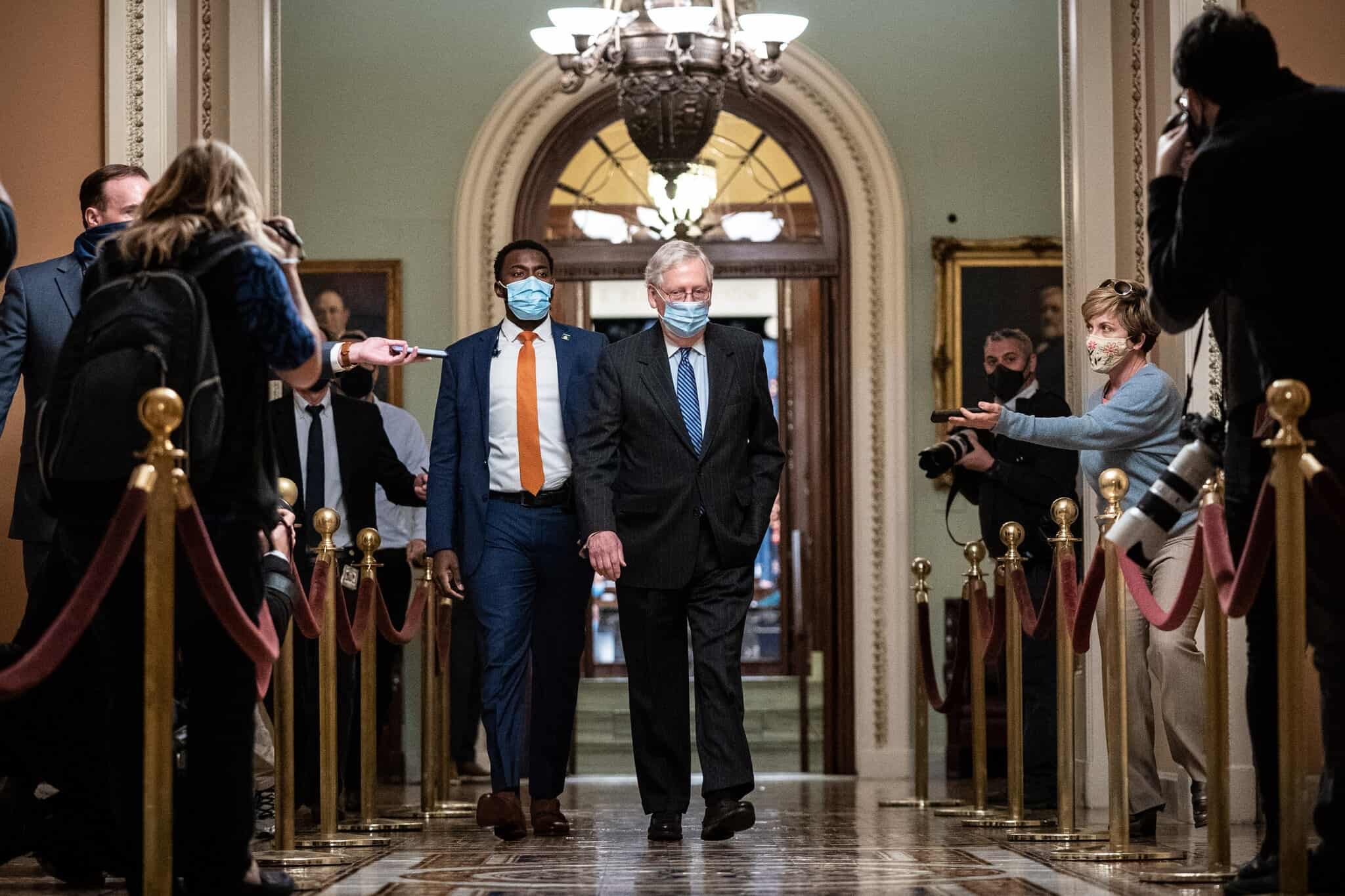
Minnie Che is a student at Harvard Law School.
Congressional leaders are close to an agreement for a stimulus package that could be as high as $900 billion. The top two Republicans and Democrats in Congress met in person for the first time on Tuesday and seemed optimistic about a final deal when they broke talks that evening. According to The New York Times, the plan would include another round of direct stimulus payments and more unemployment benefits. Additionally, the plan is expected to provide billions of dollars’ worth of funding for vaccine distribution, schools, and small businesses. However, compromises were made on both sides. The Republicans’ sought after pandemic liability protections for businesses and the Democrats’ push for aid to state and local governments are seemingly omitted from the package. Yesterday, Senator Mitch McConnell stated, “We committed to continuing these urgent discussions until there’s an agreement.” Final details are still in the works, including the amount of direct stimulus payments, but an agreement to keep the government funded beyond Friday expected to emerge soon. Otherwise, millions of Americans could go weeks with no source of income.
With the first doses of the covid-19 vaccine being distributed this week, the Equal Employment Opportunity Commission has issued new guidance on anti-discrimination in the workplace. Employers that require employees to receive the vaccine must meet certain requirements under federal anti-discrimination laws. The agency outlines employer compliance mandates under the Americans with Disabilities Act (ADA), Title VII of the 1964 Civil Rights Act, and the Genetic Information Nondiscrimination Act (GINA). Under the ADA, employers are required to give reasonable accommodations for individuals with disabilities, and the guidelines further clarify what kinds of information an employer may request from the employee and what medical examinations, such as body temperature checks, are allowed. Under Title VII, employers must explicitly communicate to their workforce that fear of the pandemic should not be directed at individuals because of a protected trait, such as race, national origin, or religion. Under the GINA, employers may not use genetic information to make decisions related to employment and can only acquire or disclose such information under narrow circumstances. Guidance from public health authorities is likely to change as the pandemic evolves. Therefore, employers should follow the most current information on maintaining workplace safety.
The Supreme Court has agreed to hear the National Collegiate Athletic Association’s appeal on a ruling that held it violated antitrust law by unlawfully limiting competition for college athletes. The NCAA was found to have maintained tight restrictions on the compensation of college athletes related to their education. The Ninth U.S. Circuit Court of Appeals held, “NCAA limits on education-related benefits do not play by the Sherman Act’s rules.” The appeals court affirmed that college athletes are to receive compensation for the cost of educational supplies, such as laptops or musical instruments, or be guaranteed access and scholarship to graduate or vocational school. But the Ninth Circuit stopped short of granting college athletes unrestricted remuneration. Things have been changing in the world of college sports. Last year, California passed a law that forced schools to allow athletes to profit from their name and likeness, and the NCAA changed their rules to follow suit. But they maintain their position in their appeal that the court rulings will fundamentally change the institution by “blurring the traditional line between college and professional athletes.” The Supreme Court is expected to hear the petition in spring 2021 and render a decision by end of June.
New York legislators may act to raise taxes on high-income individuals this month as the state continues to deal with a large budget deficit worsened by the pandemic. One state official has stated that state lawmakers are pushing for higher tax rates to be retroactive to an earlier date in 2020, which would raise the revenue needed to offset the $8 billion in cuts to education and social services funding in April. One official’s team reported that the new tax rate is expected to affect New Yorkers making $2 million or more in annual income, while another says negotiators are willing to increase taxes on those making $1 million or more. The Fiscal Policy Institute estimates that if New Yorkers’ with income over $1 million were taxed at a rate of 10.75%, the state could generate up to $5.28 billion a year. However, critics of the plan worry that the higher levies would incentivize New York high earners to relocate out of the state, especially now that a large number of them are continuing to work remotely.
Massachusetts securities regulators are planning to file a complaint against popular trading platform Robinhood Financial LLC, in which they allege that the company aggressively marketed to inexperienced investors and did not implement controls to protect their customers and their assets. In doing so, Robinhood violated state laws and regulations by exposing their investors to “unnecessary trading risks” and “falling far short of the fiduciary standard” that requires brokers and agents to act in their clients’ best interests. The new fiduciary standard was implemented this year in Massachusetts after the U.S. Circuit Court struck down the Labor Department’s fiduciary rule two years prior due to government overreach. A spokesperson from Robinhood said that the company had not yet seen the complaint but plans to work closely with the regulators. “Robinhood has opened up financial markets for a new generation of people who were previously excluded,” she said. “We are committed to operating with integrity, transparency, and in compliance with all applicable laws and regulations.”






Daily News & Commentary
Start your day with our roundup of the latest labor developments. See all
December 11
In today’s News and Commentary, Biden’s NLRB pick heads to Senate vote, DOL settles a farmworker lawsuit, and a federal judge blocks Albertsons-Kroger merger. Democrats have moved to expedite re-confirmation proceedings for NLRB Chair Lauren McFerran, which would grant her another five years on the Board. If the Democrats succeed in finding 50 Senate votes […]
December 10
In today’s News and Commentary, advocacy groups lay out demands for Lori Chavez-DeRemer at DOL, a German union leader calls for ending the country’s debt brake, Teamsters give Amazon a deadline to agree to bargaining dates, and graduates of coding bootcamps face a labor market reshaped by the rise of AI. Worker advocacy groups have […]
December 9
Teamsters file charges against Costco; a sanitation contractor is fined child labor law violations, and workers give VW an ultimatum ahead of the latest negotiation attempts
December 8
Massachusetts rideshare drivers prepare to unionize; Starbucks and Nestlé supply chains use child labor, report says.
December 6
In today’s news and commentary, DOL attempts to abolish subminimum wage for workers with disabilities, AFGE reaches remote work agreement with SSA, and George Washington University resident doctors vote to strike. This week, the Department of Labor proposed a rule to abolish the Fair Labor Standards Act’s Section 14(c) program, which allows employers to pay […]
December 4
South Korea’s largest labor union began a general strike calling for the President’s removal, a Wisconsin judge reinstated bargaining rights for the state’s public sector workers, and the NLRB issued another ruling against Starbucks for anti-union practices.